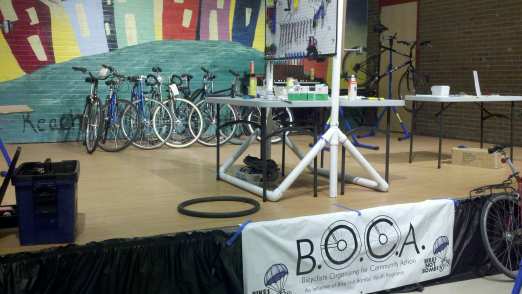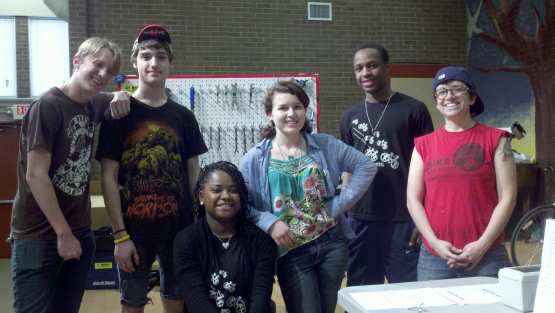
Chain Reaction’s mobile bike shop setup at the Yawkey Club of Roxbury.
Sometimes ideas pop into one’s head without warning. Other times, ideas evolve slowly based on observations, insights, and inspiration. The method by which an idea is generated is not as important as the idea itself. And when a good idea is generated, someone should invest in it to bring it to fruition.
To that end, a group of Boston teens came up with an idea worth pursuing. The five teens, Evan Hanlon, 17, of Roslindale; Corrina Roche Cross, 17, of Brookline; Abdul Hussein, 16, of Jamaica Plain; Stephane Alexandre, 17, of Mattapan; and Will Gifford, 17 of Jamaica Plain were employed at Bikes Not Bombs, a non-profit located in Jamaica Plain, Massachusetts, when they decided to start a youth-based organization called Chain Reaction. This venture is part of a community organizing project within Bikes Not Bombs’ Youth Employment Program, B.O.C.A., which stands for Bicyclists Organizing for Community Action.
The impetus for starting a project like Chain Reaction was the teens’ observation of low bike usage in many low-income neighborhoods. They hoped to counter this trend by making bikes more affordable for children. To achieve this goal, they created Boston’s first mobile, after-school bike shop and training center, which specializes in offering low-cost bike sales and repairs to neighborhoods without access to bicycle shops.

(Picture left to right) Chain Reaction creators Will Gifford, 17 of Jamaica Plain, Evan Hanlon, 17, of Roslindale, Stephane Alexandre, 17, of Mattapan, Corrina Roche Cross, 17, of Brookline, and Abdul Hussein, 16, of Jamaica Plain with Sarah Braker, Bikes Not Bombs Youth Development Specialist, will continue to repair bikes and provide free lessons to low income Boston residents, thanks to a new grant from Citizens Bank.
Their idea was formally recognized as a worthwhile venture when they were named by Citizens Bank as one of two northeast winners of the “Banking on Youth” competition. Banking on Youth provides young adults with an opportunity to showcase a nonprofit venture that directly benefits society.
Conceived by the Consumer Bankers Association Foundation and Ashoka Ventures, the competition requires entrants to develop a creative and fun, 90-second video demonstrating the importance and impact of their program. The assessment criteria for selecting Banking on Youth winners are: Innovation, Social Impact, Sustainability, and Visibility (the judges take into account the interest of the general public in the 90-second videos by assessing the quantity and quality of the comments and tweets as well as the Facebook “likes” and shares on the Banking on Youth website). Citizens Bank, one of the sponsoring banks, awarded $1,000 of seed money to Chain Reaction to allow them to build and expand their program.
Last March, Chain Reaction launched the project using space provided by the Boys & Girls Clubs of Boston. With the Roxbury and Dorchester clubs as their operations base, the Chain Reaction founders have refurbished and sold dozens of bikes for a minimal cost. Many more bikes have received basic repairs. In addition to the refurbished bikes and repairs, Chain Reaction offers “Learn-it, Earn-in” repairs, where bike owners can work with a team member and learn how to fix their bikes, free of charge.
When asked how they became interested in starting a project for bikes and bicycling, Chain Reaction team member Stephane Alexandre provided the following explanation:
“The goal of Chain Reaction was to spread bike culture throughout the low income neighborhoods of Boston. We partnered with the Boys & Girls Clubs of Boston, who gave us space, and access to youth, and over the course of that spring, we went to three different clubs. We spent our afternoons selling affordable bikes, teaching mechanics lessons and repairing bikes that the clubs would use in their summer programs. At every club we connected with youth, usually the ones who had never been interested in the academic or sports activities offered.
Our other goal was to start to collect data to one day show our city representatives that bike lanes and shops needed to be implanted in low income neighborhoods as well as high income neighborhoods. Chain Reaction was merely an idea in early September, but by the following summer, it became a movement. We were a group of five teenagers, fixing up bikes one Boys And Girls Club at a time.
We taught kids to ride, we sold forty bikes that were on their way to landfills, we repaired dozens more with nothing but two mobile tool stands and a few rags. We put people back on the road, this time with helmets and locks. There were many reasons why we did this, but top of that was that it was clear that there was a lack of bikers in low income communities and a plethora of children suffered from asthma in neighborhoods such as Dorchester and Roxbury. The thing was that many youth probably had bikes, in their basements rotting away, and these youths lacked the simple mechanics needed to fix those bikes. We figured, if we couldn’t bring these youth to our bike shop, that we’d bring the bike shop to them.”
Not only is Chain Reaction a good idea — with respect to helping low-income kids get affordable bikes — but projects of this type are crucial for making cycling more widespread and accessible to a broader range of people, in more communities. It’s also important to get kids interested in cycling at an early age. Cycling is a multipurpose activity which anyone can take with them throughout life. It’s a quick and healthy means of travel, a way to reduce pollution and urban congestion, and a fun recreational activity.
Teaching interested kids how to repair their bikes is also valuable. This knowledge helps them to gain independence in keeping their bikes running and it provides them with useful skills.
Investing in our youth, and in our communities, is the best way to improve the livability of our cities and the quality of life of our citizens. Projects like Chain Reaction are a good first step in this direction, one which all cyclists should support, both as cyclists and as good citizens.



